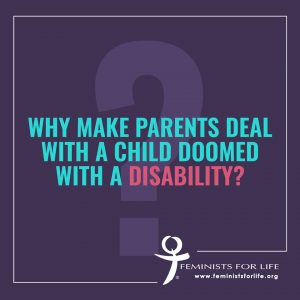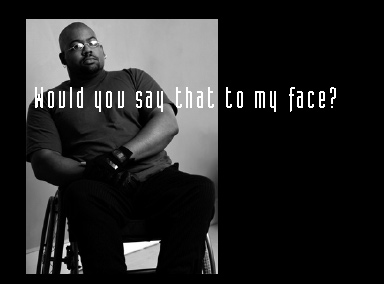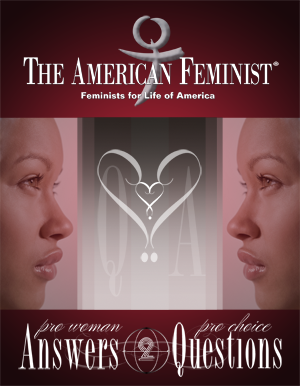
It is natural to want to “save from suffering the unborn innocent” as was written in Susan B. Anthony’s Revolution.
If actual or potential disability is a reason to devalue children before birth, what cruel message does this send to persons with disabilities who are already born?
Would you say to someone in a wheelchair that s/he should never have been born? That’s the message people get when they talk about “gross fetal anomalies.”
How many artists, musicians, writers with disabilities or no fault brain disease have enriched our world? Would artist Toulouse-Lautrec’s paintings have had a bigger impact if he were taller in stature? What would our world be like without the contributions of artist Van Gogh, musician Beethoven, or writer Sylvia Plath?
People who overcome adversities challenge and enrich our world.
Sadly, persons with disabilities have often been devalued as women once were. But through the Americans with Disability Act, we demonstrated our commitment to those with disabilities.

There is another message sent to mothers by well-meaning people, especially those in health care—that mothers should spare themselves and the world from those with special needs.
Imagine the angst of the more than 400 women in Great Britain who aborted after hearing their child would be developmentally disabled, only to learn afterward that they had aborted perfectly healthy children.
And imagine what those women have lost who aborted their specially-gifted children on the advice of well-meaning doctors, family and friends. The strongest hug I’ve ever felt in my life was a gift from a child my mother taught in special education.
Just as we desire to spare those children who are severely disabled, it is also natural for us to want to spare the parents suffering. But the children my mother taught in special ed, and the contributions that my mother and sister—both now disabled—make in this world, reveal that we never know the way the story will end, or what could have been if we refuse to end a life prematurely.
Jeannie Wallace French, executive director of the National Women’s Coalition for Life provided a powerful personal story during the 1996 hearings before the Senate Judiciary Committee on the Partial Birth Abortion Ban.
French described how physicians recommended aborting her twin daughter, Mary, after she was diagnosed with an occipital encephalocele, a form of spina bifida. (Encephalocele is a neural tube defect characterized by sac-like protrusions of the brain and the membranes that cover it through openings in the skull. The occipital region consists of the back and lower part of the skull.) However, the Frenches were determined to do everything possible to save their daughter. And if they found they were unable to take care of her, they learned there were couples awaiting adoption. Mary lived just a few hours after birth. Her father had a chance to hold her. But that’s not the end of Mary’s story.
Jeannie testified, “Three days after Mary died, on the day of her interment at the cemetery, Paul and I were notified that Mary’s heart valves were a match for two Chicago infants in critical condition. We have learned that even anencephalic and meningomyelocele children like our Mary can give life, sight or strength to others. Her ability to save the lives of two other children proved to others that her life had value—far beyond what any of us could ever have imagined.
“Mary’s life lasted a total of 37 weeks 3 days and 6 hours. In effect, like a small percentage of children conceived in our country every year, Mary was born dying. What can partial birth abortion possibly do for children like Mary? This procedure is intended to hasten a dying baby’s death. We do not need to help a dying child die. Not one moment of grief is circumvented by this procedure.”
“Our daughter, living less than a day, saved the lives of two other children. Which of us, even after decades of living, can make the same claim?” Jeannie asked.
– FFL President, Serrin M. Foster





